A Long Island man ran a prostitution ring out of his elderly parents' sprawling suburban home, enticing women with drugs and locking them in a basement where he forced them to use a bucket instead of a bathroom, prosecutors said Thursday.
Raymond Rodio III, 47, used social media to recruit and advertise the women, got them hooked on heroin or crack cocaine, and forced them to have sex with men in the basement of the home, in Sound Beach, or at nearby motels, Suffolk County District Attorney Tim Sini said.
"This is a dangerous and depraved individual," Sini said after Rodio's arraignment. "He kept women locked up in the basement of his parents' house. He used the basement of his parents' home as a dungeon."
Rodio operated the ring for about four years and victimized more than 20 women, Sini said.
Rodio's parents, who are in their 70s, may have known "something untoward" was going on, but not necessarily that their son was running a prostitution ring, Sini said. They are not charged with a crime.
Rodio pleaded not guilty Thursday to sex trafficking, promoting prostitution and other charges. He remains jailed because he hasn't posted $1 million cash bail or $2 million bond.
His next court appearance is scheduled for May 21. If convicted of the top charge, he faces up to 25 years in prison.
A message seeking comment was left with his lawyer.
Police uncovered the alleged prostitution ring after a routine traffic stop last August. Officers recognized that a passenger in the car appeared to be a victim of human trafficking, Sini said.
"As chilling and cruel as this case is, sex trafficking would not be possible or lucrative if not for the people who pay to the opportunity to sexually degrade the women being kept in these conditions," said National Sexual Violence Resource Center spokeswoman Kristen Houser.
From the outside, Rodio's parents' home appears typical of Sound Beach — a quiet, waterfront community about 60 miles (100 kilometers) east of midtown Manhattan on Long Island's north shore. Recent photos show a half-dozen American flags in the home's spacious, meticulously manicured yard. There are birdhouses, wagon wheels and a driveway basketball hoop.
Inside, through a door and down the stairs from an unfinished garage, was a vile, windowless hellscape where Rodio held women for long stretches without access to a shower, a bathroom or the outside world, Sini said.
Rodio's makeshift brothel featured a bed with a leopard-print comforter, but also walls lined with family portraits and Jesus on a prayer card, Sini said. There were shelves full of lotions, a bottle of chocolate syrup and "all sorts of items that one could suspect were used in sex acts," Sini said.
"It's disgusting," he said.
In recruiting women, Sini said, Rodio targeted women who appeared to have drug dependence or who were somehow otherwise vulnerable. He would initially supply them with drugs for free so they would be dependent on him, the prosecutor said. Then, after setting them up with clients, he'd give them heroin or crack to impair their judgment, Sini said.
Rodio would use the money the clients paid to buy the women more drugs and underwrite his own crack habit, Sini said. If they resisted seeing a client or didn't fork over enough of the fees, he'd scream at them, Sini said. The flow of drugs made the women indebted to Rodio, Sini said, and the only way they could repay it was by performing sex acts.
"This is a common tactic used by traffickers. They essentially force their victims to become addicted to drugs, then use that addiction — that illness — to keep victims under their control," Sini said.
Follow Michael Sisak at twitter.com/mikesisak
Send news tips, documents and recordings to AP securely and confidentially: https://www.ap.org/tips/
SEOUL, South Korea (AP) — The United States and its allies are discussing options “both inside and outside the U.N. system” to create a new mechanism for monitoring North Korea over its nuclear weapons program, the American ambassador to the United Nations said Wednesday.
Russia last month vetoed a U.N. resolution in a move that effectively abolished monitoring by U.N. experts of Security Council sanctions against North Korea, which prompted Western accusations that Moscow was acting to shield its arms purchases from North Korea to fuel its war in Ukraine.
“I look forward to engaging with both the Republic of Korea and Japan, but like-minded (countries) as well, on trying to develop options both inside the U.N. as well as outside the U.N. The point here is that we cannot allow the work that the panel of experts were doing to lapse,” U.S. Ambassador Linda Thomas-Greenfield told a news conference in Seoul, using the formal name for South Korea.
Thomas-Greenfield didn’t provide specific details about U.S. discussions with allies and other partners, including whether an alternative monitoring regime would more likely be established through the U.N. General Assembly or with an independent entity outside of the U.N.
Thomas-Greenfield met with South Korean Foreign Minister Cho Tae-yul on Monday and they discussed unspecified “next steps to ensure a continuation of independent and accurate reporting” of North Korea’s illicit weapons development activities, according to her office.
Thomas-Greenfield said it was clear that Russia and China, which abstained from voting on the U.N. resolution vetoed by Moscow, will continue to try to block international efforts to maintain monitoring of U.N. sanctions against North Korea. She criticized Russia for violating those sanctions with its alleged arms purchases from North Korea, and China for protecting the North from being held accountable.
Moscow and Beijing have thwarted U.S.-led efforts to tighten U.N. sanctions on North Korea over its ramped-up ballistic missile testing since 2022, underscoring a divide between permanent Security Council members that deepened over Russia’s war on Ukraine.
“I don’t expect that they will cooperate or agree with any efforts that we make to find another path, but that is not going to stop us from finding that path moving forward,” Thomas-Greenfield said.
Thomas-Greenfield also briefly addressed questions about tensions in the Middle East. When asked about the Palestinian Authority's request to have full U.N. membership, she said a U.N resolution in support of that request would not contribute to finding a two-state solution to the Israeli-Palestinian conflict.
“President Biden has said categorically that we support a two-state solution for addressing the situation in the Middle East, where Palestinians will have a state of their own and Israel is secure in their state, and we are working on the ground to get to that place as quickly as possible,” she said.
“We do not see that doing a resolution in the Security Council will necessarily get us to a place where we can find a ... two-state solution moving forward," she added.
Tensions on the Korean Peninsula are at their highest point in years, as North Korean leader Kim Jong Un has accelerated his weapons demonstrations and issued provocative threats of nuclear conflict against rivals.
The United States, South Korea and Japan have responded by expanding their combined military exercises and sharpening their nuclear deterrence strategies built around strategic U.S. assets.
In a telephone conversation on Wednesday, South Korean President Yoon Suk Yeol and Japanese Prime Minister Fumio Kishida agreed to further strengthen three-way cooperation with Washington to counter North Korean threats and other regional challenges amid “deepening uncertainties in the international situation,” Yoon’s office said.
The Security Council imposed sanctions after North Korea’s first nuclear test explosion in 2006 and tightened them over the years in a total of 10 resolutions seeking — so far unsuccessfully — to cut funds and curb its nuclear and missile programs. The last sanctions resolution was adopted by the council in December 2017.
The Security Council established a committee to monitor sanctions, and the mandate for its panel of experts to investigate violations had been renewed for 14 years until last month.
Russia’s U.N. Ambassador Vassily Nebenzia told the Security Council before last month’s vote that Western nations are trying to “strangle” North Korea and that sanctions are losing their “relevance” in preventing the proliferation of nuclear weapons in the North.
In its most recent report circulated last month, the panel of experts said it is investigating 58 suspected North Korean cyberattacks between 2017 and 2023 valued at approximately $3 billion, with the money reportedly being used to help fund its weapons development.
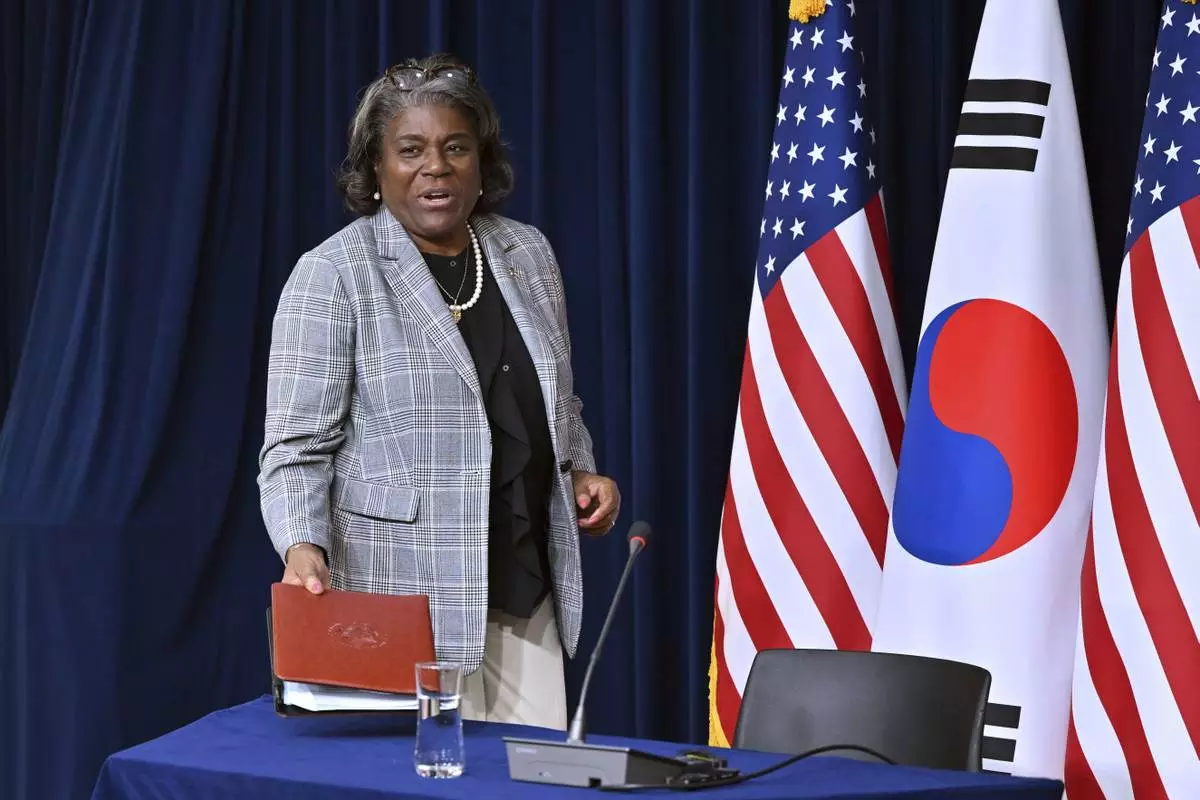
U.S. Ambassador to the United Nations Linda Thomas-Greenfield arrives to attend a press conference at the American Diplomacy House in Seoul Wednesday, April 17, 2024. (Jung Yeon-je/Pool Photo via AP)
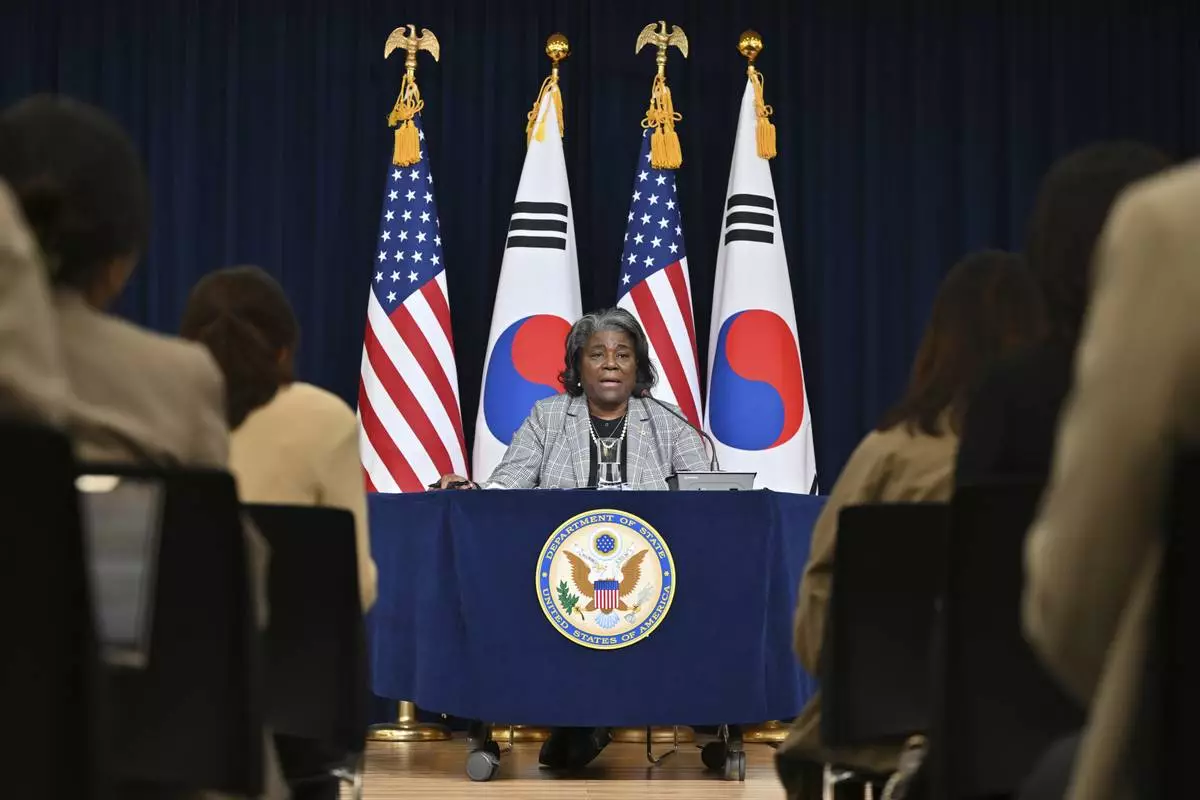
U.S. Ambassador to the United Nations Linda Thomas-Greenfield speaks during a press conference at the American Diplomacy House in Seoul Wednesday, April 17, 2024. (Jung Yeon-je/Pool Photo via AP)
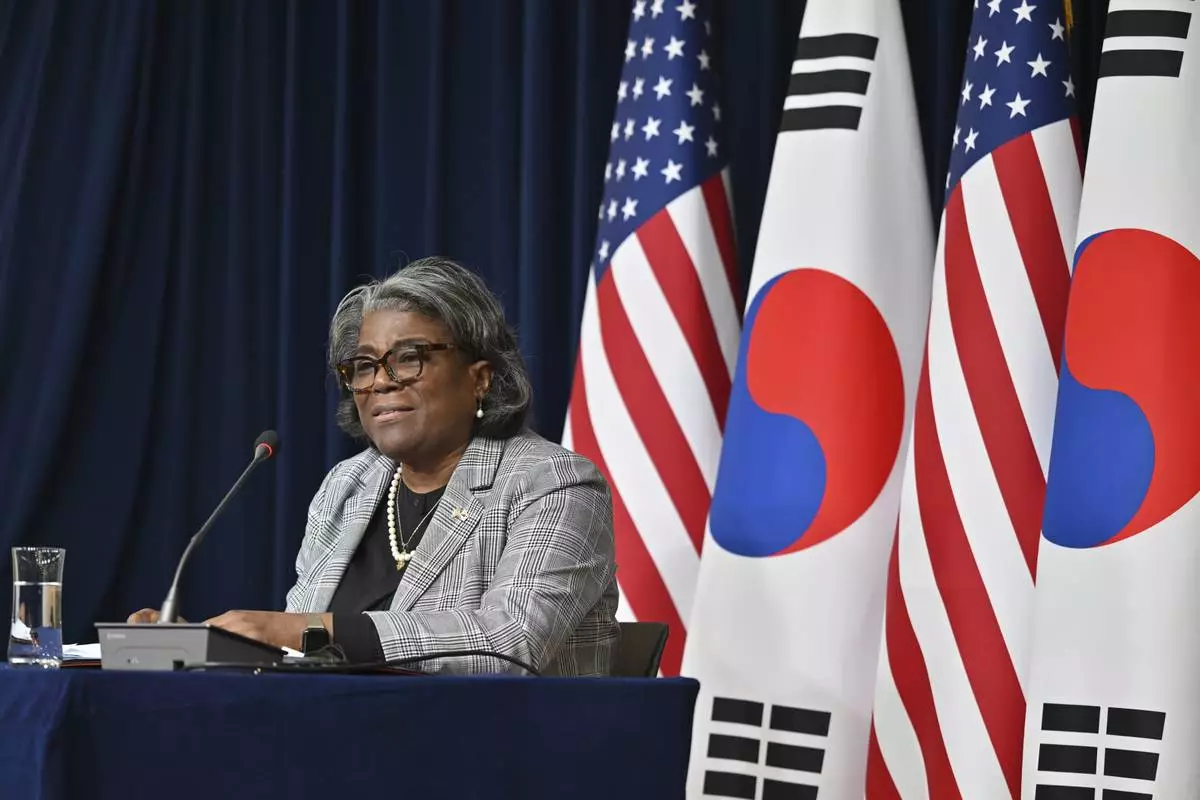
U.S. Ambassador to the United Nations Linda Thomas-Greenfield speaks during a press conference at the American Diplomacy House in Seoul Wednesday, April 17, 2024. (Jung Yeon-je/Pool Photo via AP)
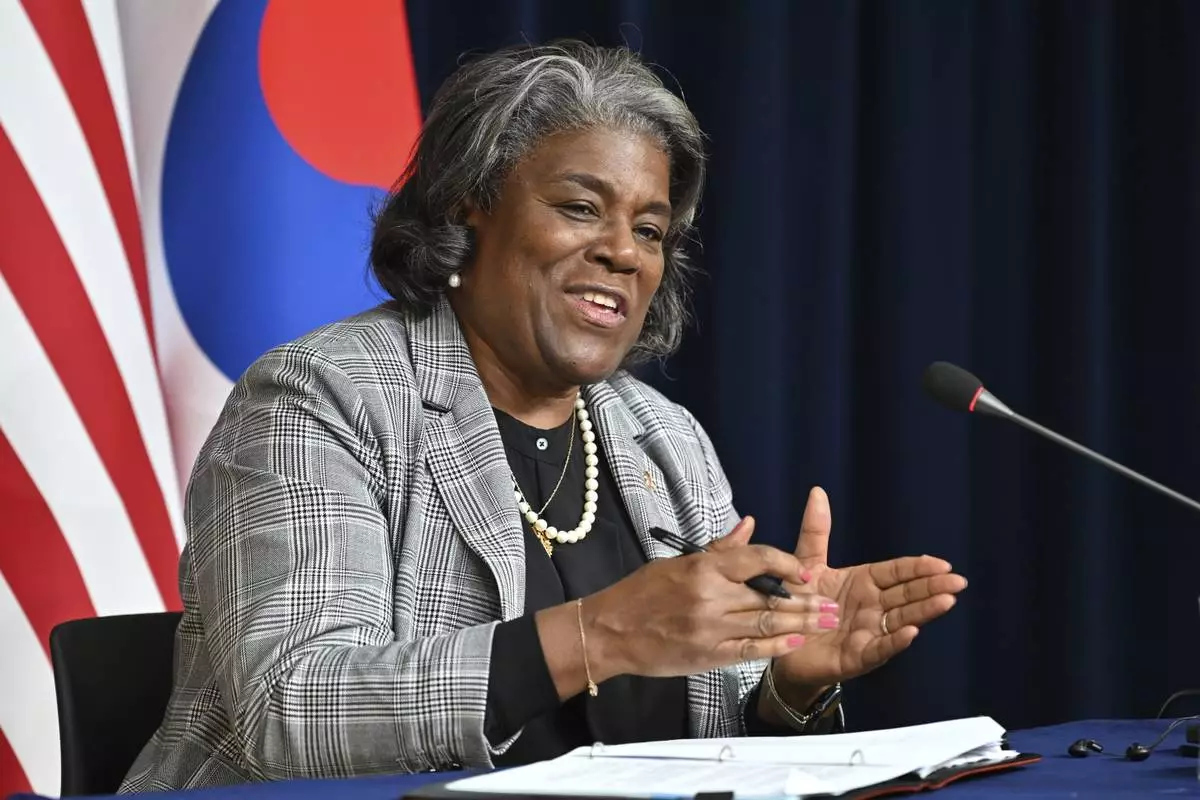
U.S. Ambassador to the United Nations Linda Thomas-Greenfield speaks during a press conference at the American Diplomacy House in Seoul Wednesday, April 17, 2024. (Jung Yeon-je/Pool Photo via AP)
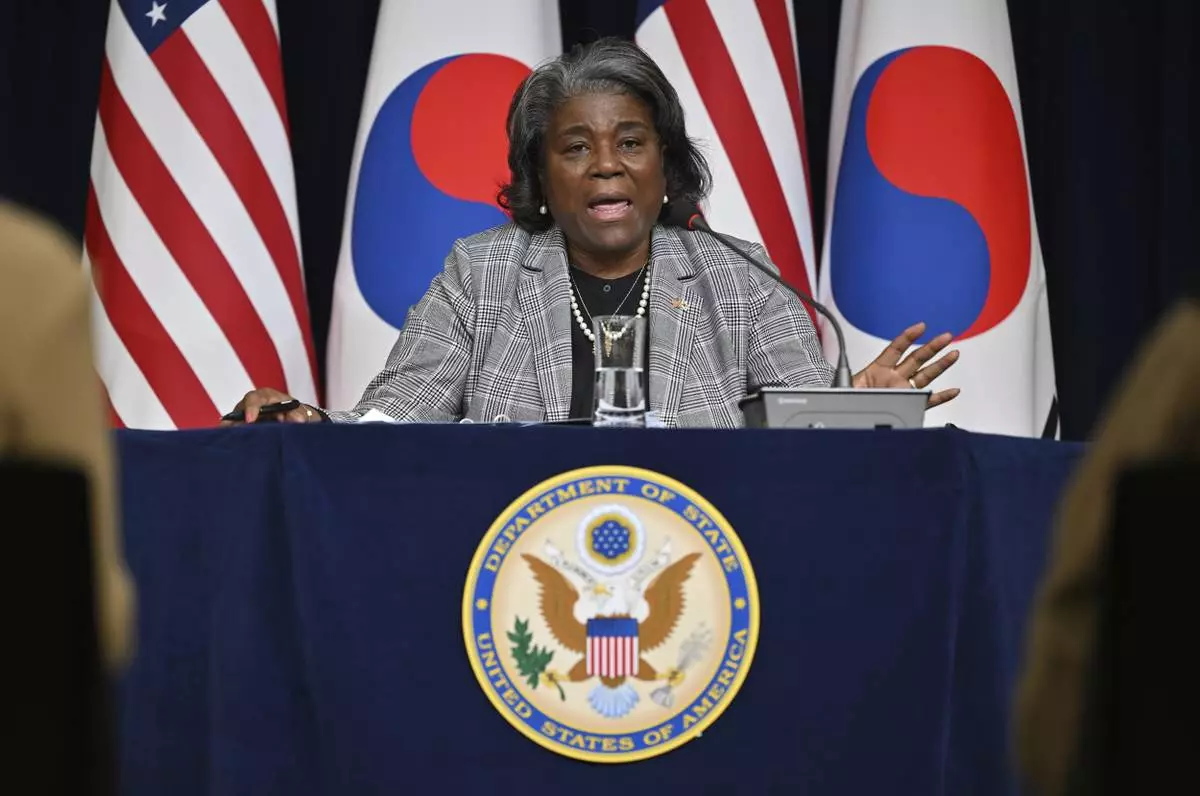
U.S. Ambassador to the United Nations Linda Thomas-Greenfield speaks during a press conference at the American Diplomacy House in Seoul Wednesday, April 17, 2024. (Jung Yeon-je/Pool Photo via AP)
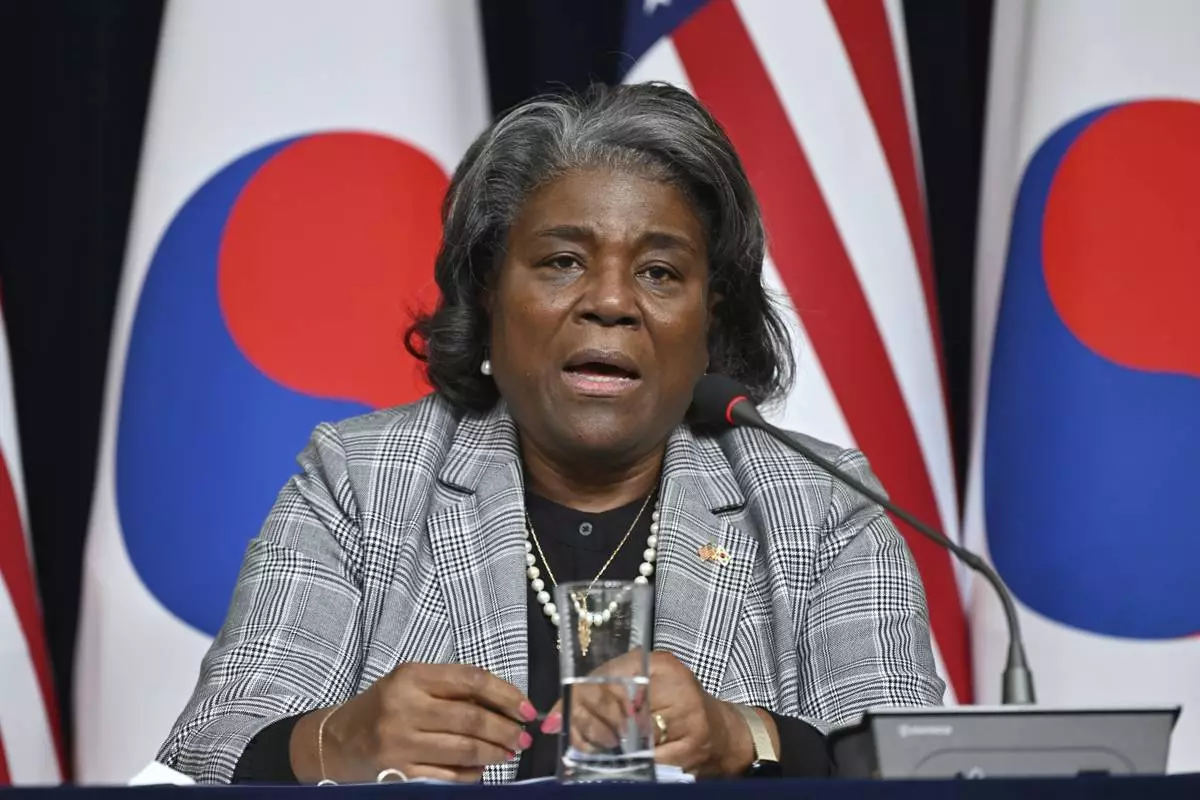
U.S. Ambassador to the United Nations Linda Thomas-Greenfield speaks during a press conference at the American Diplomacy House in Seoul Wednesday, April 17, 2024. (Jung Yeon-je/Pool Photo via AP)















